Understanding the resilient capacities of local actors during and after violent conflicts, has been one of Interpeace’s main objectives in the past two years. Determining how these existing capacities for resilience can be strengthened to contribute to sustainable peace, has been at the heart of our programme Frameworks for Assessing Resilience (FAR), implemented in three contexts: Guatemala, Liberia, and Timor-Leste.
During two years, Interpeace and the Centre of Studies for Peace and Development (CEPAD) led a multi-stakeholder process that sought to identify and promote resilient capacities of the people in Timor-Leste. The research encompassed an inclusive and participatory process that engaged communities at the grassroots, as well as representatives of civil society organizations and government institutions. The project generated rich qualitative and quantitative data and analysis, through in-depth interviews and focus groups, forums, dialogue processes, and a nationwide survey polling close to 3,000 respondents.
On June 15 2016, CEPAD organized the launch of the Frameworks for Assessing Resilience final reports and the Deputy Director General of Interpeace, Renée Larivière, participated in the event by discussing the work of Interpeace and CEPAD, and the importance of a resilience lens in peacebuilding contexts.
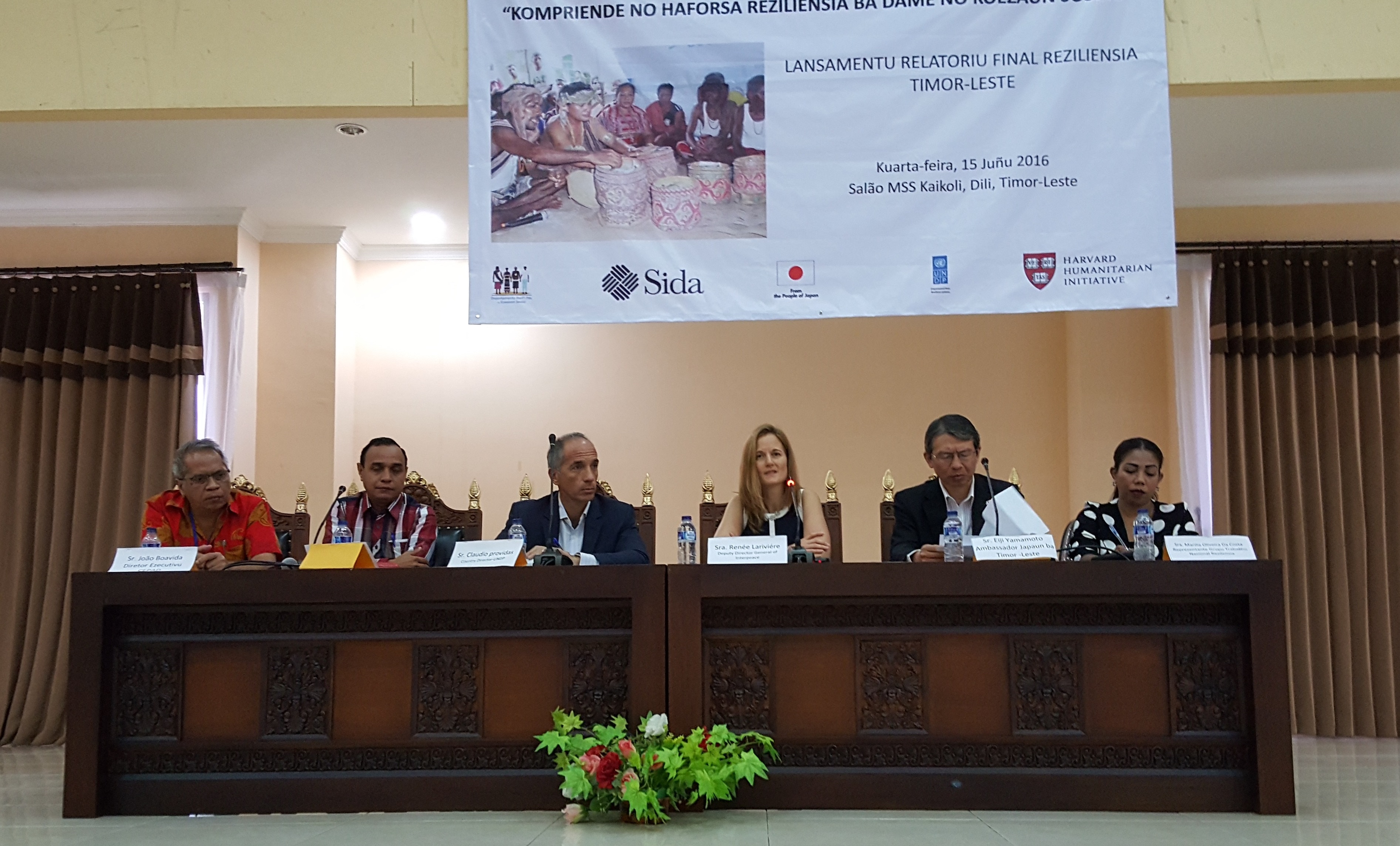
Speakers at the launch of FAR final report in Timor-Leste on June 15, 2016: Mr. Joao Boavida, Executive Director - CEPAD; Ministry of Social Solidarity; Mr. Claudio Providas, Country Director - UNDP; Ms. Renée Larivière, Deputy Director General of Interpeace; Mr. Eiji Yamamoto, Japan Ambassador for Timor-Leste; Member of National Working Group.
Through the findings of this research, recommendations and plans of action were developed to understand what resilience for peace looks like and how it can be strengthened in Timor-Leste. According to the results of this research, the key to resilience lays in the strengthening of the relations between the state and its citizens, which relies on trust, inclusion, justice and active participation. A national working group was created during the validation of the findings and will be focusing on promoting good quality leadership at all local and national levels as a positive contribution to strengthening the resilient capacities of Timorese.
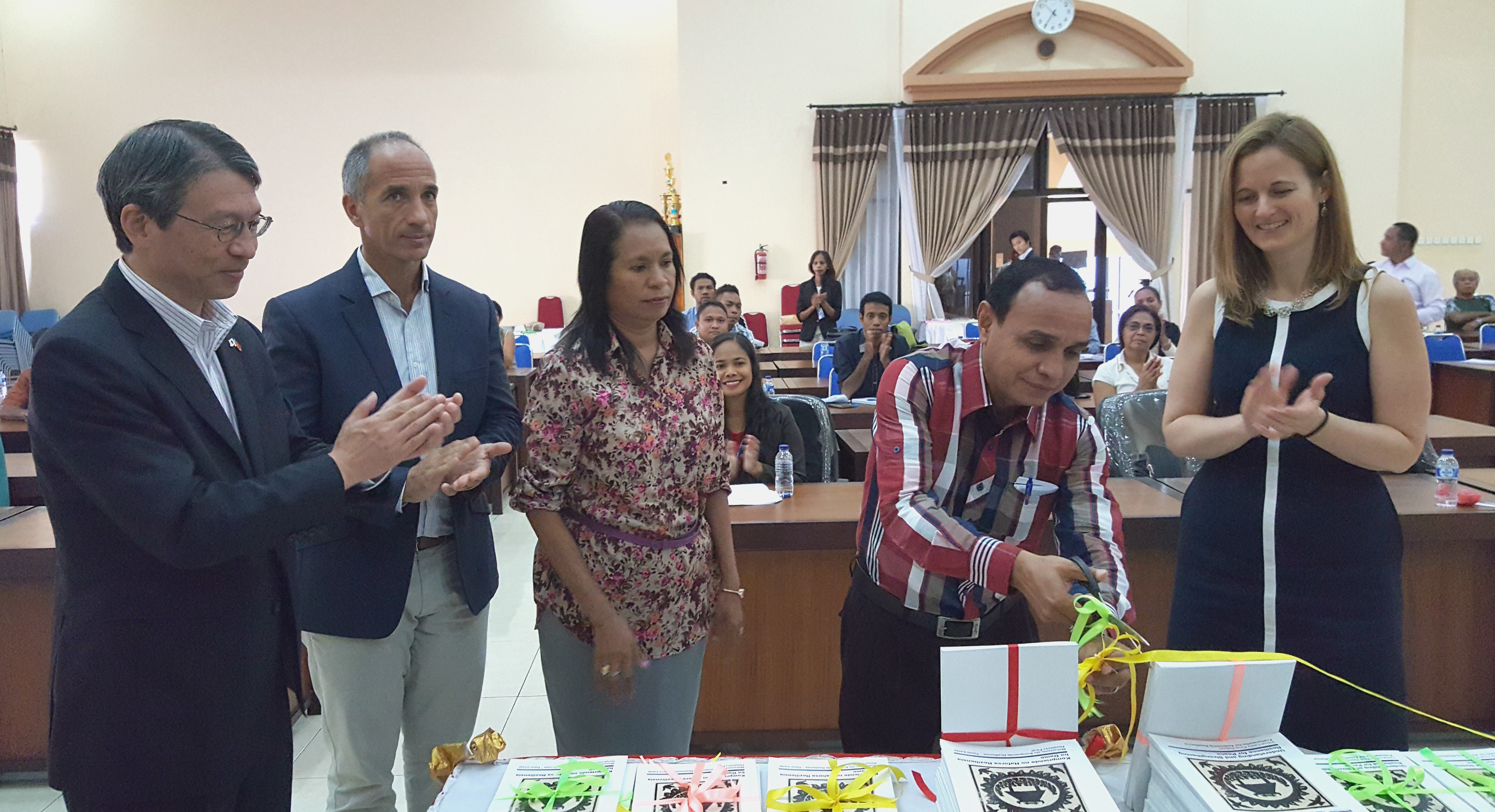
Timor-Leste launch of the FAR final reports.
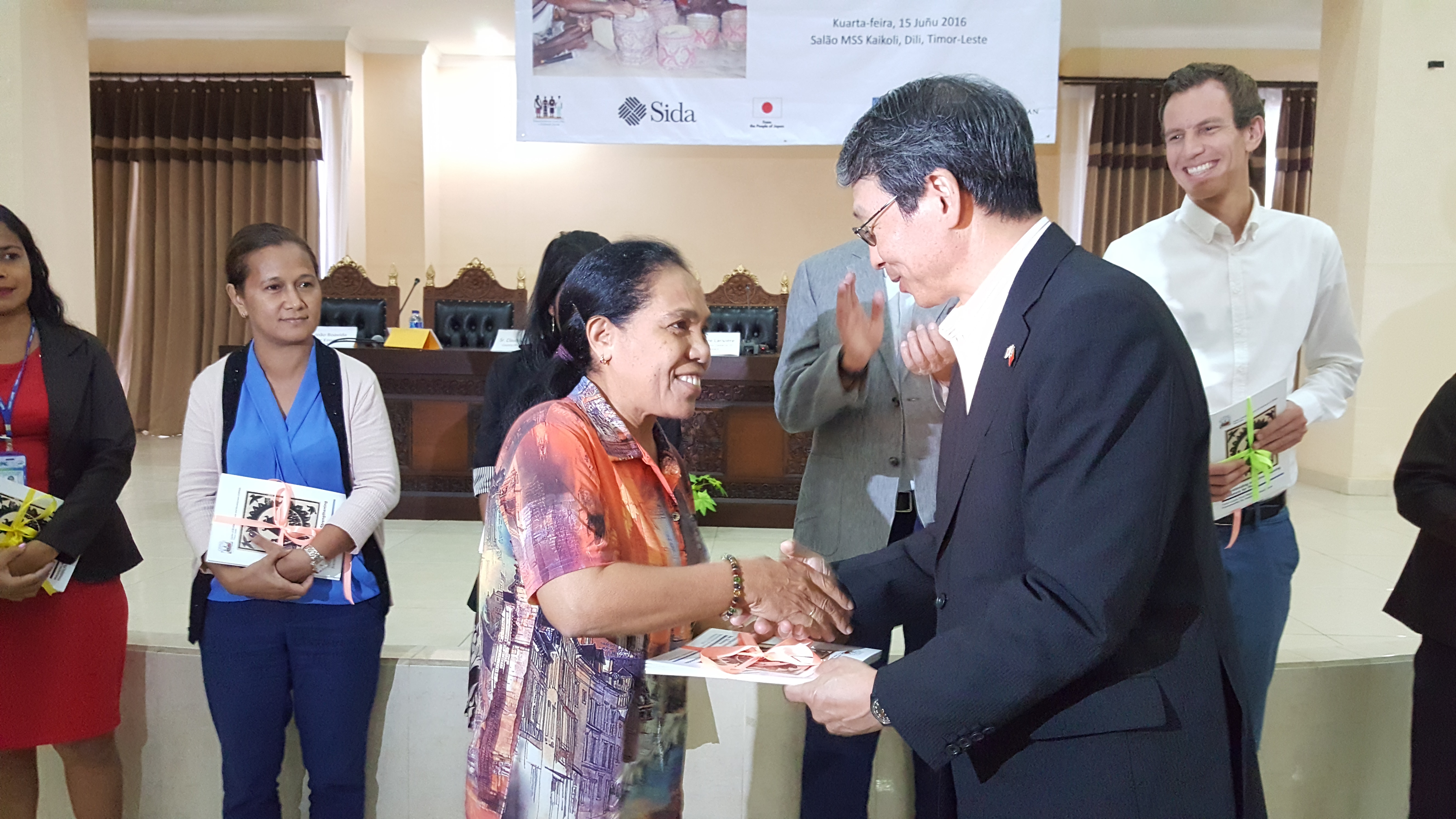
Timorese receive FAR final reports.
To learn more about the findings and results of the FAR programme in Timor-Leste read the final report: Understanding and Strengthening Resilience for Peace.
For additional information:
Read report published by CEPAD in April 2015: Understanding Resilience from a Local Perspective.
Read survey report published by HHI in April 2016: Population-Based Survey on Attitudes and Perceptions About Resilience and Peace.
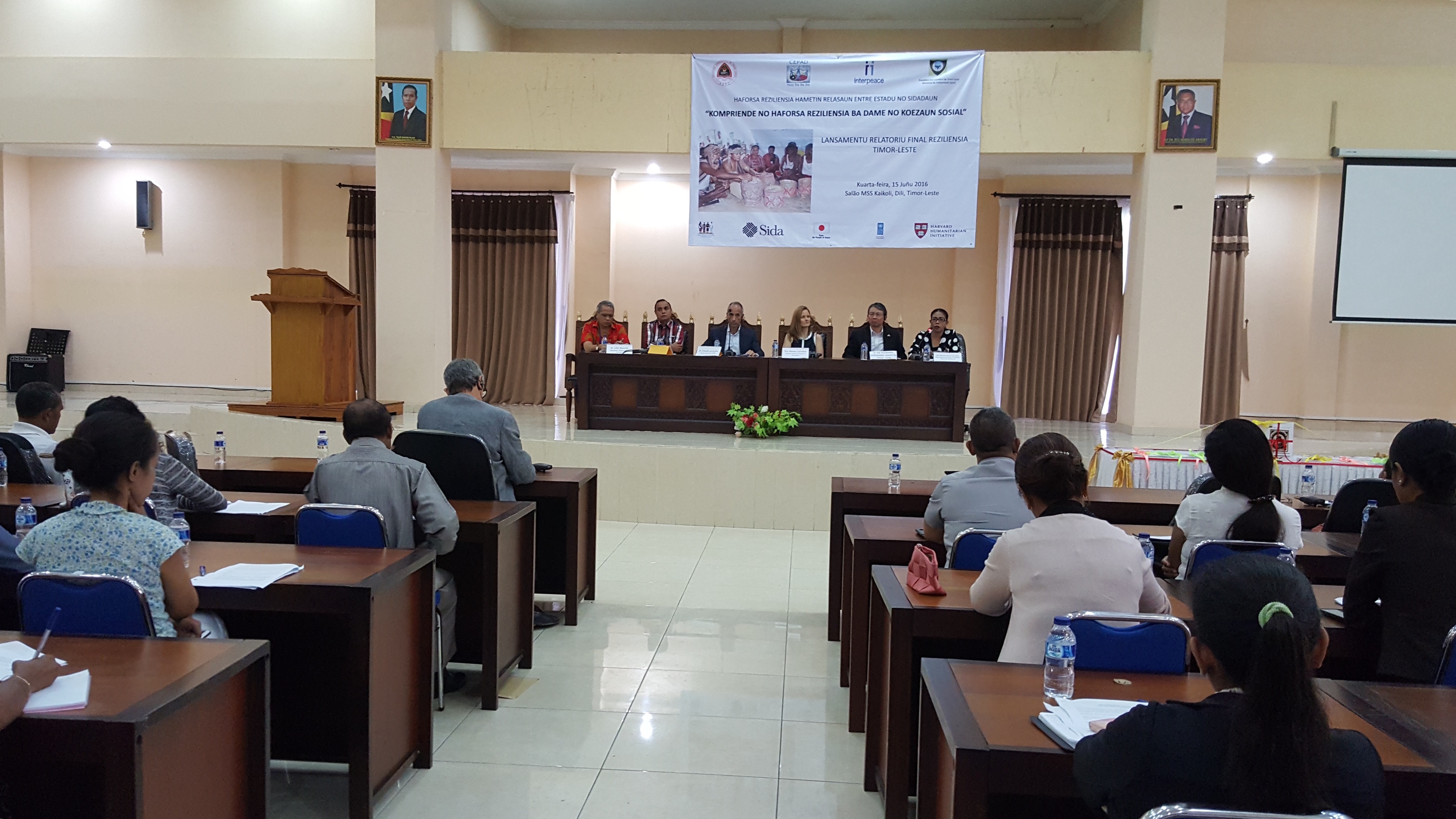
Event organized by CEPAD to launch FAR final reports in Timor-Leste
Until recently, criminal violence, inter-communal violence and gender violence, committed by organized crime and armed groups, was an issue that received very little interest by the international community. These acts of violence were categorized as “undeclared wars,” and therefore were believed to hold minimal international threat. As a result, there were no policies nor relevant scientific disciplines involved in the mitigation of these acts.
However, in some countries the number of civilians killed by armed social violence is significantly higher than the people killed in traditional wars. After the Cold War, it became evident that these forms of violence, even though they were not politically motivated, had significant political effects at the national and international levels.
Bernardo Arévalo, Senior Peacebuilding Advisor in Interpeace’s International Peacebuilding Advisory Team (IPAT), and Ana Glenda Tager, Regional Director of Interpeace (Latin American Office), wrote the main article in the last Handbook Dialogue of the Berghof Foundation, addressing how there must be a context-specific strategy to this issue. The article entitled “Armed Social Violence and Peacebuilding- Towards an operational approach,” seeks to argue that in order to solve the urban violence phenomena, there must be a “bottom-up, inside-out approach that requires the adaptation of the administrative and operational frameworks through which the international community works.”
In other words, international actors in their interventions must understand the specific profile of violence in every society: learn the scope and intensity of its use, comprehend its meaning for the local actors, as well as its functionality for socioeconomic and political life. Once these issues are identified, the design of strategies to transform or eradicate armed social violence will be more effective and sustainable.
For more information, read the article here.
The Berghof Handbook Dialogues address critical issues that are debated among practitioners and scholars from diverse regions of the world and different disciplines. Each topic that is chosen is relevant to the practice of conflict transformation.
Over 80% of humanitarian emergencies around the world today are conflict-related. More than half of all these crises are protracted conflicts of 8 years or more. Whereas immediate needs of vulnerable and suffering populations are only increasing, the trend will not abate unless we focus greater attention on preventing these conflicts in the first place and resolving existing ones more sustainably.
The brave people working to build peace in such contexts tend to focus their attention on the fault-lines of a country, the nature of broken relationships and mistrust that are at the heart of a society’s fragility. Those efforts often overlook deep sources of resilience that exist even in the most difficult circumstances. When identified and enhanced, those factors of positive resilience provide a powerful basis upon which to build a more durable peace.
It is with this vision that Interpeace initiated the Frameworks for Assessing Resilience Programme in order to identify, analyze and strengthen sources of resilience for peace. With case studies in Liberia, Guatemala and Timor-Leste, local people and their authorities were engaged through qualitative consultations, quantitative surveys and multi-sectoral dialogue processes in order to articulate - in their own voice - the endogenous capacities for resilience for peace that they possess.
The experience of assessing resilience for peace in three pilot countries, combined with an expert-practitioner dialogue on resilience as well as an extensive literature and practice review has fed into the development of a framework and guidance note on assessing resilience for peace. This Guidance Note will enable practitioners and policy makers working in the peacebuilding and related fields to integrate a resilience approach and indeed resilience assessments into their work
For practitioners, resilience assessments can complement conflict analyses in the design of conflict-sensitive and context-specific policy and programming, whilst also drawing attention to the endogenous capacities that exist at different levels of society. It can also offer a crucial tool, for national and international actors alike, to assess what progress is being made (or not) over time towards the strengthening of sources of resilience for peace, the reduction of risks of conflict and, crucially, the prevention of factors of fragility.
For policy-makers, a resilience approach has a strategic value in seeking to provide a common language – resilience – upon which greater synergies can be nurtured between the fields of peacebuilding on one hand, and humanitarian action, development assistance and disaster recovery, on the other.
The Guidance Note will be launched during a panel discussion hosted by Interpeace in Stockholm on June 9th.
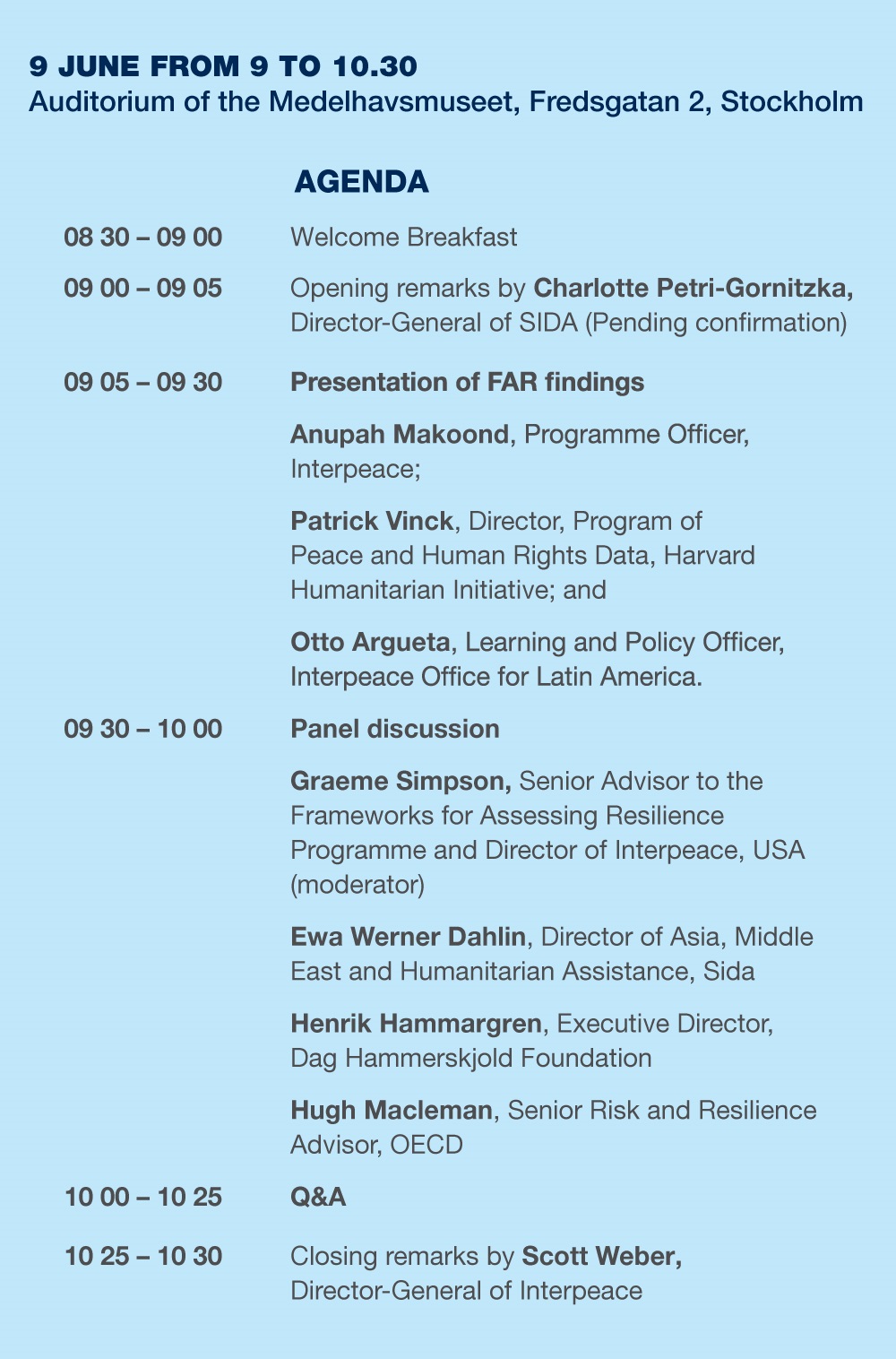
Agenda for the Stockholm FAR Launch event
Read Guidance Note for Assessing Resilience for Peace.
Read a short brief that captures what the FAR experience has taught us about the specificities of resilience in relation to conflict and the added value of using a resilience approach to peacebuilding.
Read a briefing note on the relevance of Resilience for Peace to the pursuit of the Agenda 2030 Sustainable Development Goals.
Read more about the specific case studies:
Liberia
Read the Liberia Report.
Timor-Leste
Read the Timor-Leste Report.
Read Survey Report for TimorLeste.
Guatemala
Read the Guatemala Report.
Read Survey Report for Guatemala.
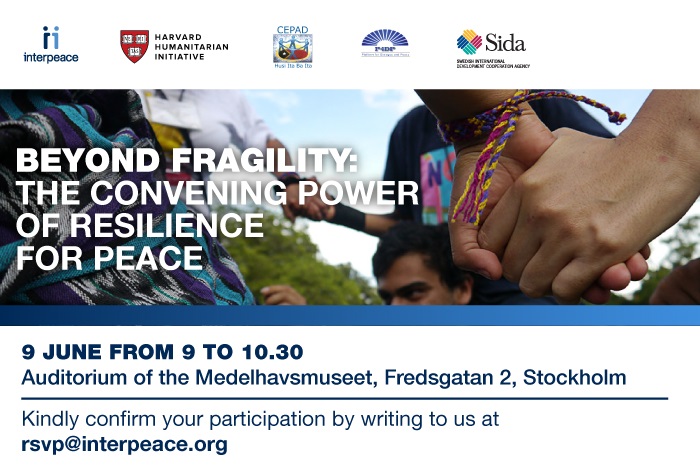
On 22 May, Interpeace’s Local Facilitator in Sweden, Tomas Amanuel participated in a debate on Swedish Television’s Agenda program with Interior Minister Anders Ygeman and Centre Party Leader Annie Lööf to discuss the efforts needed to address increasing crime in Stockholm’s marginalized suburbs.
To reduce crime, the Government is seeking to put new resources in place by strengthening police presence in the suburbs. Minister Ygeman pointed to the need of getting better at crime prevention. Annie Lööf agreed that more police officers are needed but that crime prevention measures must be combined with investment in education, jobs and housing.
Tomas Amanuel from Interpeace stressed the importance of strengthening dialogue with those who live in the suburbs and people most affected by the problems. In order for any efforts to be effective and lasting, decision-makers need to understand the challenges from the perspective of the residents and involve them in the discussion on what solutions are needed. The police have an important role to play but in order to solve the problem of social exclusion in the long term, cooperation between local actors is critical, and major social investments in education and job opportunities for young people are needed.
When posed the question: “Do you think there is a plan today and that the politicians have a plan to overcome exclusion and criminality in these areas?” Tomas replied:
"I have lived in Tensta for 26 years and worked for over 5 years with young people in Tensta. […]What I think should be done is to involve people from these areas and find out what their real needs are."
Tomas is part of Interpeace’s team leading an initiative on the challenges to social inclusion in Sweden. The pilot, which started in the Stockholm suburb of Tensta in 2013 has now expanded to involve other areas in Stockholm, Malmö and Luleå. The dialogue and consultations that were carried out in these communities shed light on what inclusion means for different groups in Swedish society. Interpeace’s work in Sweden aims to bring the voices of local communities closer to the decision-makers and to the broader society. To that end, the project will be launching an awareness-raising campaign to highlight the importance of inclusive societies and the need to foster interactions between people and communities in Sweden.
Here you can watch the full interview with Tomas (in Swedish) starting 22:48 minutes into the program.
Tomas Amanuel was also interviewed by the Dag Hammarskjöld Foundation in an inspiring Q&A about the power of dialogue when engaging youth. Read blog article here.
Vikten av dialog för att motverka utanförskap i Sverige
Den 22a maj deltog Interpeace’s Tomas Amanuel i en debatt i SVTs Agenda tillsammans med Inrikesminister Anders Ygeman och Centerpartiets partiledare Annie Lööf för att diskutera vilka insatser som krävs för att bekämpa den växande kriminaliteten i Stockholms marginaliserade förorter.
För att minska brottsligheten satsar regeringen nu resurser på att stärka polisens närvaro i förorten. Anders Ygeman pekade på behovet av att bli bättre på arbeta med att förebygga brott i förorterna. Annie Lööf höll med om att det krävs fler poliser men att brottsförebyggande åtgärder måsta kombineras med satsningar på utbildning, jobb och bostäder.
Tomas Amanuel från Interpeace betonade vikten av att stärka dialogen med de som bor i förorten och de som drabbas hårdast av problemen. För att satsningarna ska vara effektiva och hållbara måste beslutsfattare förstå utmaningarna från de boendes perspektiv och involvera dem i diskussionen om vilka lösningar som behövs. Polisen har en viktig roll att spela men för att lösa det centrala problemet med socialt utanförskap på lång sikt krävs samarbete mellan lokala aktörer liksom stora sociala satsningar på utbildning och arbetstillfällen för unga.
På frågan: - Tycker du att det finns en plan idag och att politikerna har en plan för hur man ska bryta utanförskapet och kriminaliteten i de här områdena? Svarade Tomas:
”Jag har bott i Tensta i 26 år och jobbat i över 5 år med ungdomar i Tensta [...] Det jag tycker man ska göra är att involvera människor från dessa områden och ta reda på vad deras verkliga behov är.”
Tomas är en av dem som lett Interpaces initiativ kring utmaningarna för social integration i Sverige. Pilotprojektet som startade i Stockholmsförorten Tensta 2013 har nu utvidgats till att involvera fler områden i Stockholm, Malmö och Luleå. Dialog och konsultationer som genomförts med allmänheten i dessa områden har belyst vad inkludering innebär för olika grupper i det svenska samhället. Interpeace arbete i Sverige syftar till att föra allmänhetens röster närmare politiker och beslutsfattare. För detta ändamål kommer projektet att lansera en informationskampanj som betonar vikten av ett inkluderande samhälle och behovet av att främja möten i samspelet mellan människor och lokalsamhällen i Sverige.
Här kan du se hela intervjun med Tomas som startar 22.48 minuter in i programmet.
Tomas Amanuel har också intervjuats av Dag Hammarskjöld Foundation i Uppsala. Det blev ett inspirerande blogginlägg om kraften av dialog som ett verktyg för att engagera ungdomar i frågor som rör inkludering och social förändring. Här kan du läsa hela intervjun med Tomas.
Last week, about 8,000 participants gathered in Istanbul, for the first World Humanitarian Summit. The event was launched to bring together world leaders, representatives from the humanitarian and development sectors, and other actors to identify and commit to new ways of addressing what has been described as the greatest global humanitarian challenges the world has faced since World War II.
Interpeace was there to contribute recommendations to this new wave of humanitarian reform.
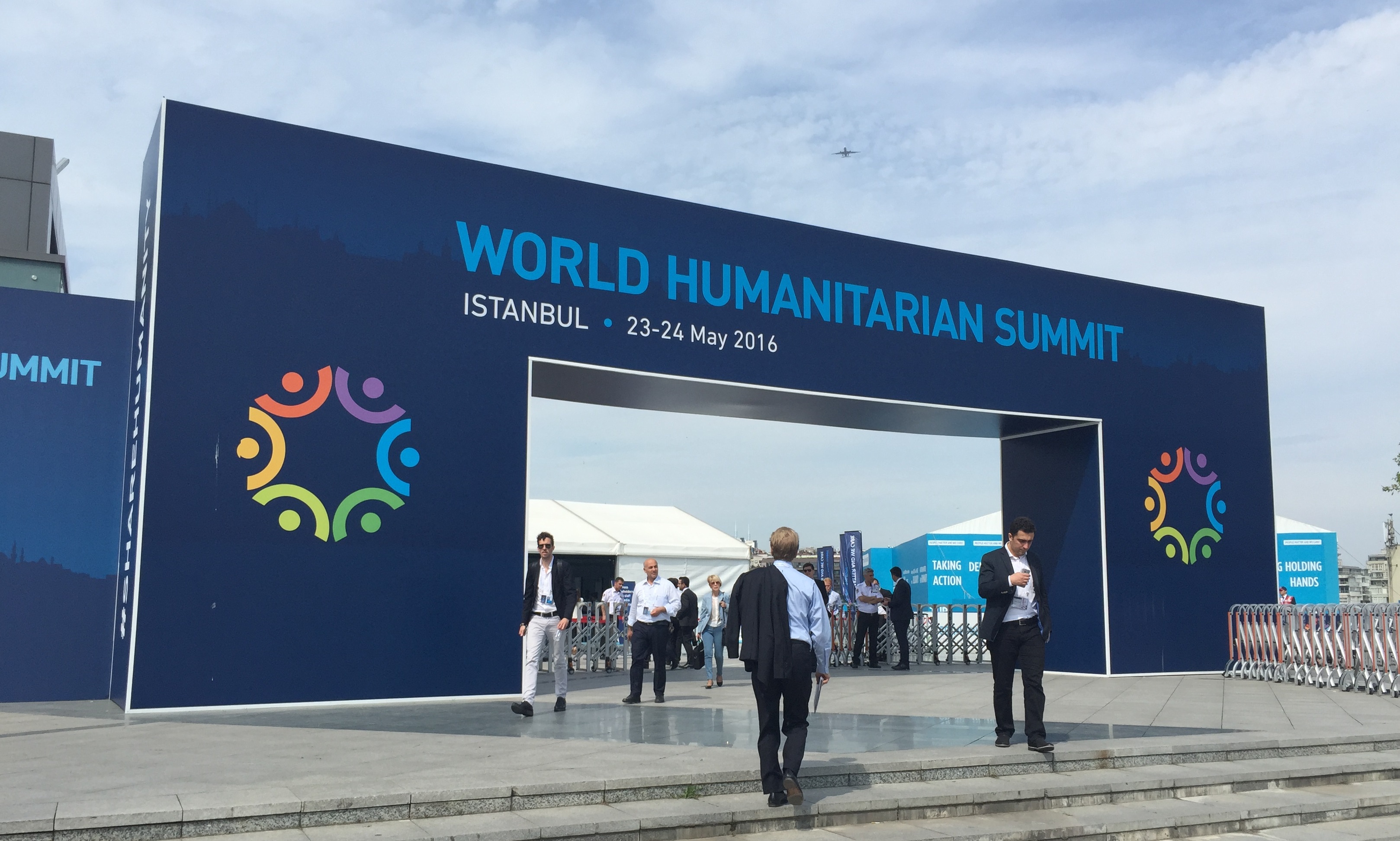
World Humanitarian Summit - Istanbul 2016
Conflict is a key factor in the current humanitarian crisis, which has seen humanitarian need outstrip available resources: today, 80% of humanitarian aid is delivered in response to violent conflict. Strategies are therefore urgently needed to limit cycles of violence and long-term need, reduce people’s risks and vulnerability, and improve people’s abilities to become more self-reliant.
Interpeace’s inputs focused on the practical question of how humanitarian response can help break cycles of violence and need. “We don’t propose that humanitarian actors should become peacebuilding actors,” said Interpeace’s Lisa Rudnick, discussing her talk at the WHS. “Rather, we propose that, especially in fragile contexts where social and political ties are broken, local capacities for resilience to violent conflict can and should be strengthened through the ways humanitarian actors partner with local actors. But to do that, we need to move beyond partnerships on paper’ to meaningful partnerships.”
Meaningful partnerships signify an important shift not only for how internal and external actors work together, but also why. “Partnerships can be a powerful tool for strengthening resilience,” says Nene Morisho, Director of Pole Institute, Goma, DRC. “If resilience to violent conflict is the goal, then this has implications for how local partners are chosen, what role they play, and how those partnerships are evaluated.”
Interpeace’s specific recommendations for how this can be done were developed through a collaborative engagement with local partners in three contexts. Beginning in 2015, Interpeace launched a project together with Indigo in Côte d’Ivoire, Pole Institute in DRC, and Mustakbalna in Palestine to learn about local experiences of collaboration with external actors in the context of humanitarian response. When crisis hits, people are more than just beneficiaries of external aid. We wanted to learn from them how they are actors in their own experiences, and how working with external actors can contribute to the capacities a society needs to not only endure difficulty, but to move beyond what lead to conflict in the first place.
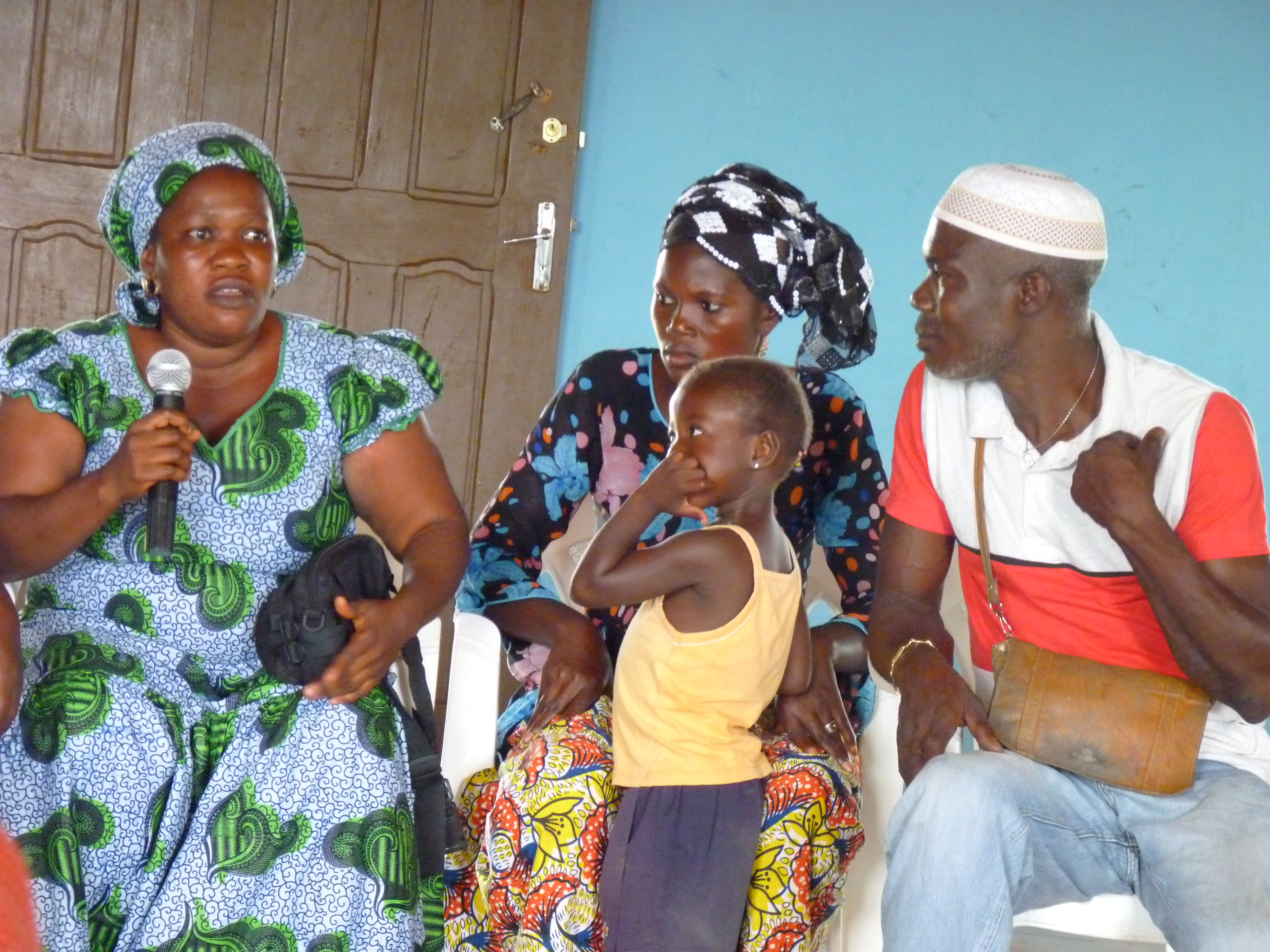
Côte d'Ivoire, Photo credit: INDIGO
The teams in all three contexts found many examples of local responses to crises, demonstrating that capacities persist even in the most adverse circumstances. Unfortunately, these were not always valorized by the international actors, who at times end up replacing rather than supporting local systems when they intervene – a tendency that the UN Secretary-General has called to reverse in the Agenda for Humanity.
“How aid is delivered is just as important as what is delivered. If you don’t build from local capacities, and if you don’t have resilience in view, you can end up doing harm when you intend to do good,” summarizes Onesphore Sematumba from Pole Institute in DRC in a video produced from the research.
Therefore, key recommendations emerging from the project and shared at the World Humanitarian Summit, are to redefine the success of humanitarian response to include strengthening resilience to violent conflict, and to adapt the system at different levels so that it does not only strive to meet immediate needs, but, in the process, strengthens societies’ social and political cohesion, inclusivity, and ability to transform beyond the fractures that fueled conflict.
Read more about our insights and recommendations here or browse a short overview of the recommendations here.
Get a glimpse of the local voices that are at the heart of the study through the accompanying video here.
After three years in limbo, the democratization process in Puntland has officially resumed with the inauguration of the Transitional Puntland Electoral Commission (TPEC) in April 2016.
The process had stalled following the postponement of elections in 2013 elections, despite unremitting pressure from civil society and other stakeholders to move the process forward.
The nine-member TPEC was officially confirmed by the Puntland House of Representatives in an extraordinary session on 24 April 2016, marking the much awaited resumption of the Puntland Democratization Process.
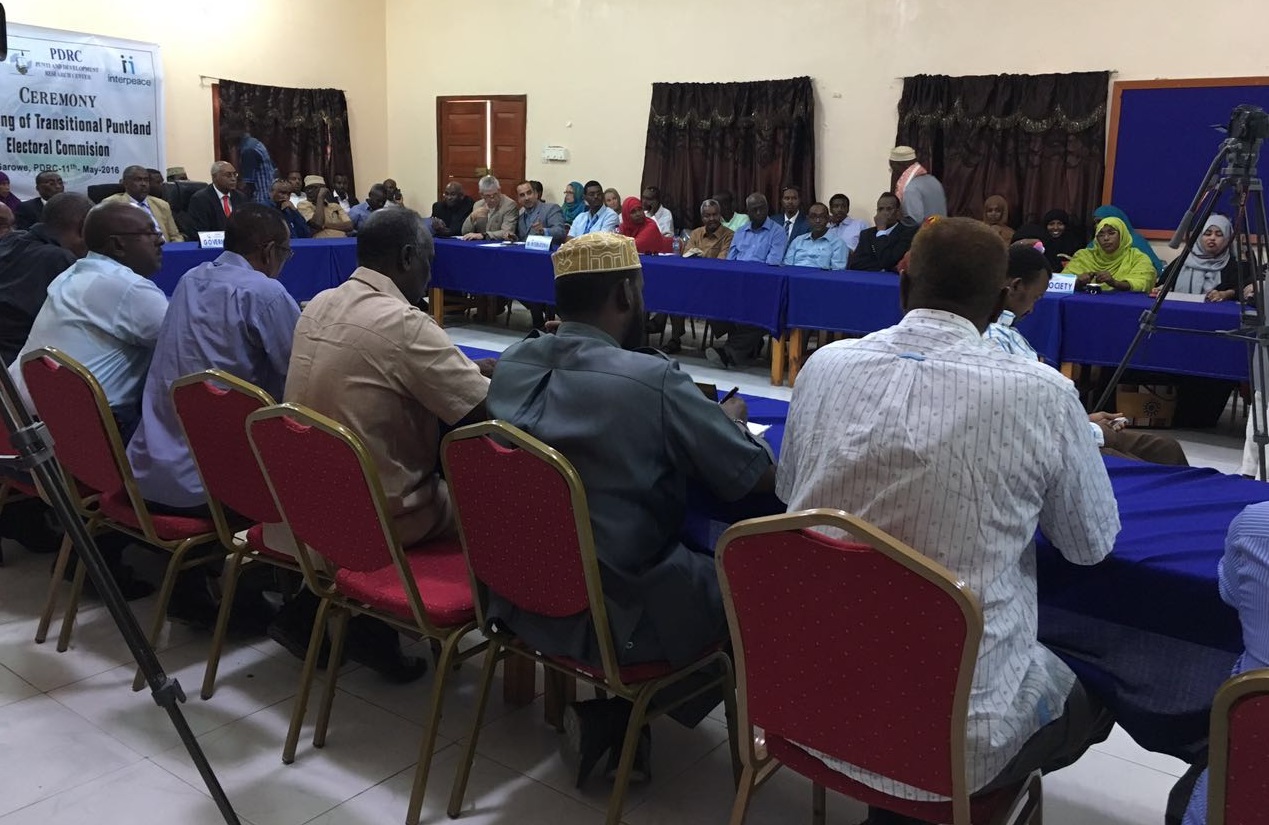
Photo credit: PDRC
Following this confirmation, Interpeace’s partner in Puntland, the Peace and Development Research Center (PDRC), worked with TPEC to organize a launch ceremony and an induction workshop for the newly endorsed commissioners.
The packed programme kicked off with PDRC Acting Director Ali Farah Ali, who laid out the important objectives of the ceremony and induction workshop. This was followed by opening remarks from the new TPEC Chairman, who highlighted the importance of all democratization stakeholders, including civil society, religious leaders, and government, to engage in the democratization process in order for it to succeed. All of these stakeholders were represented in the ceremony and enthusiastically pledged their support to the process. Later in the programme, a keynote address was delivered by Puntland Vice President Abdihakin Abdullahi Haji Omar, who emphasized the government’s commitment to supporting TPEC.
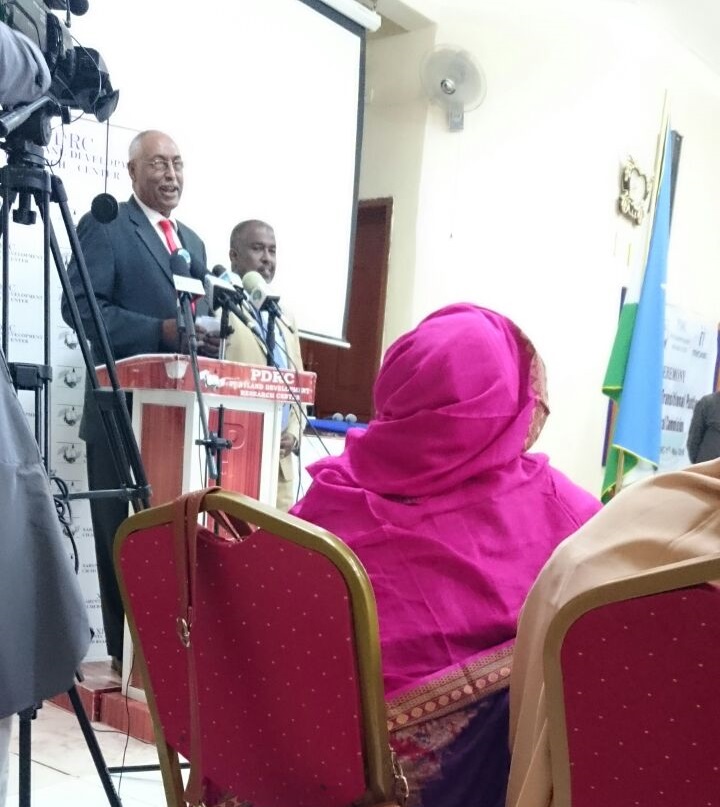
Puntland’s Vice President, Abdihakin Abdullahi Haji Omar. Photo credit: PDRC.
In the induction workshop for the new TPEC officials, the PDRC research team and members of the Commission examined important elements in the democratization process, including the legal framework and lessons learned from previous electoral processes. In a later interactive session, participants examined the next steps for TPEC in preparing for federal and provincial processes that will take place in the coming four years.
Interpeace and its partners have supported democratization processes in the Somali Region since 2005. These recent developments mark an important milestone in the Puntland Democratization Process, as well as in the wider Somali Democratization Process.
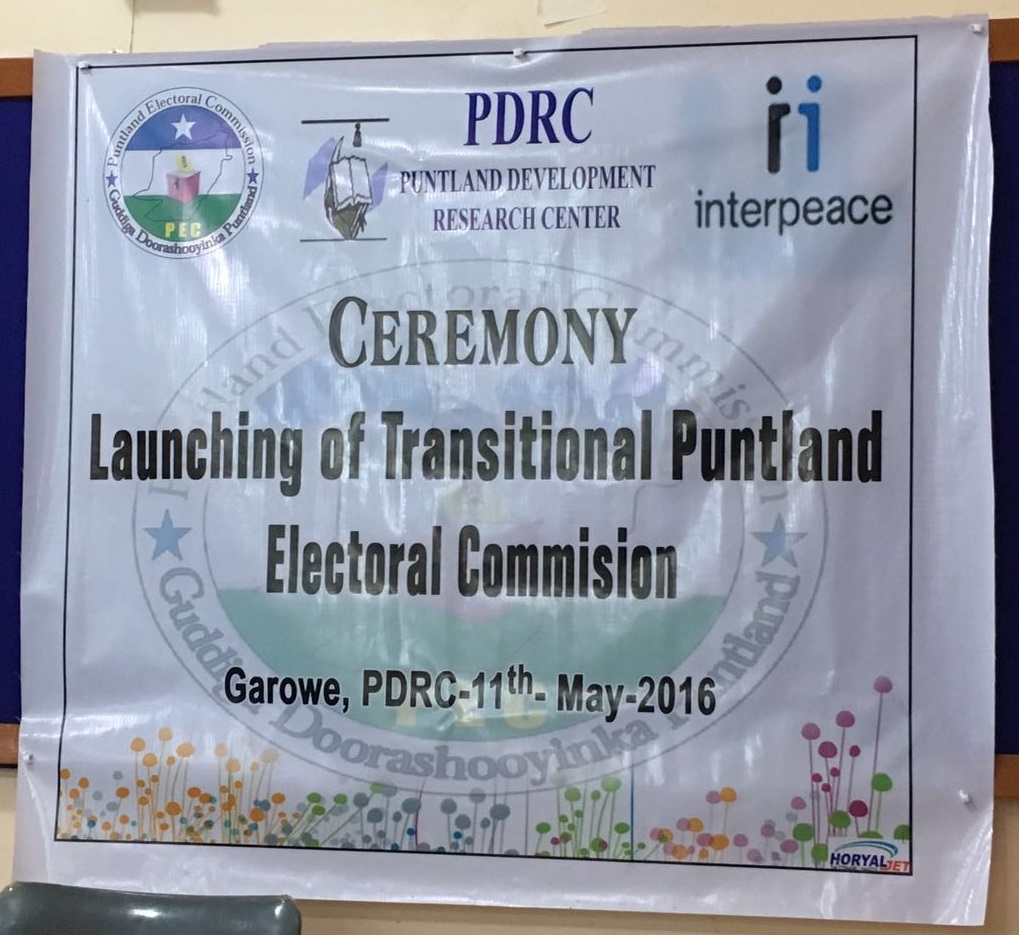
Photo credit: PDRC.























